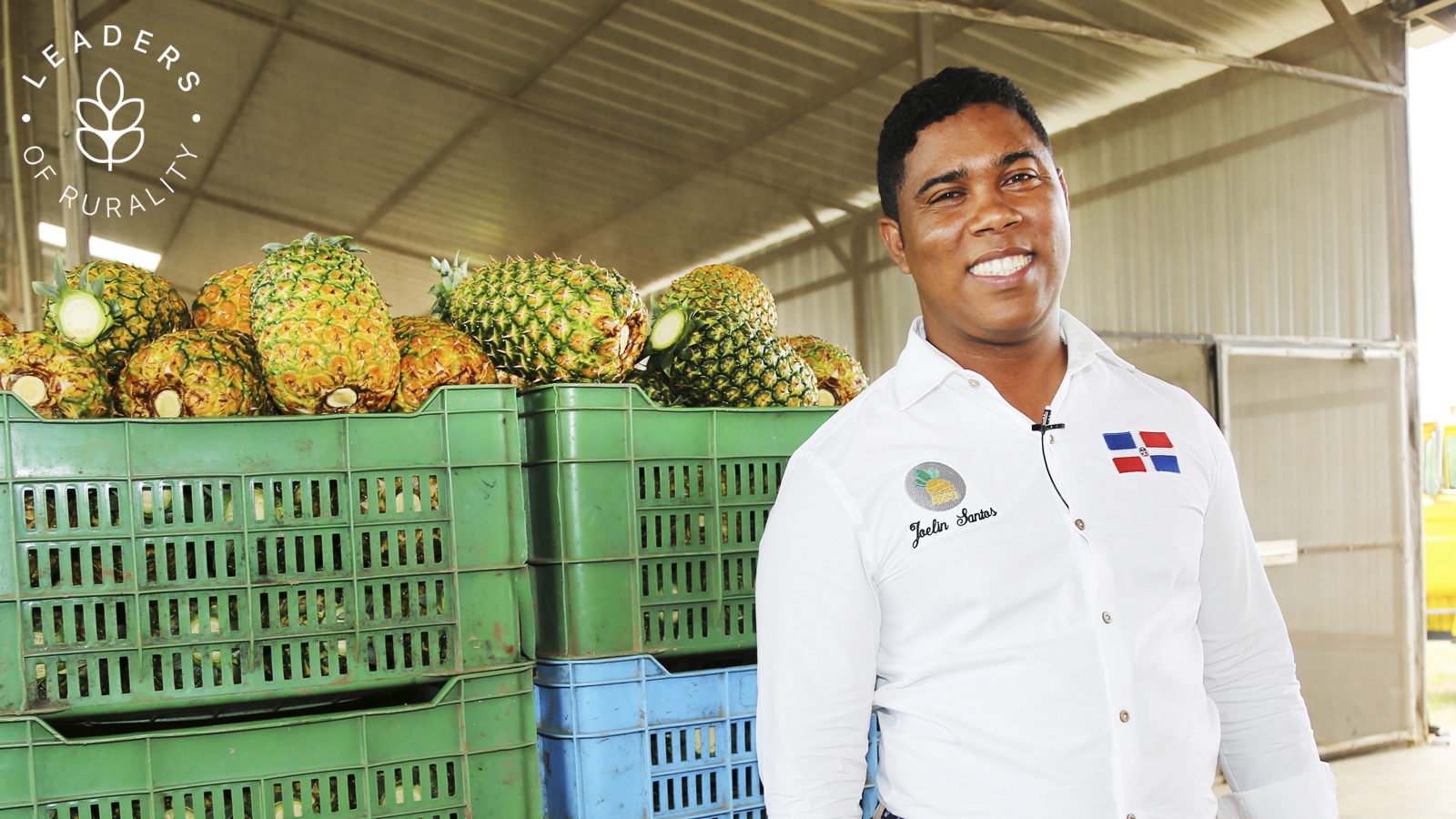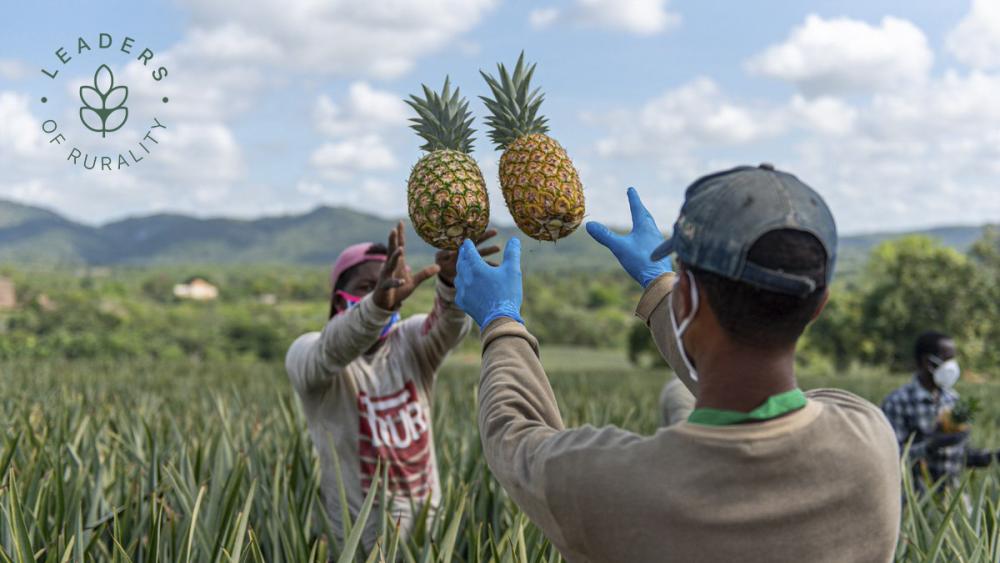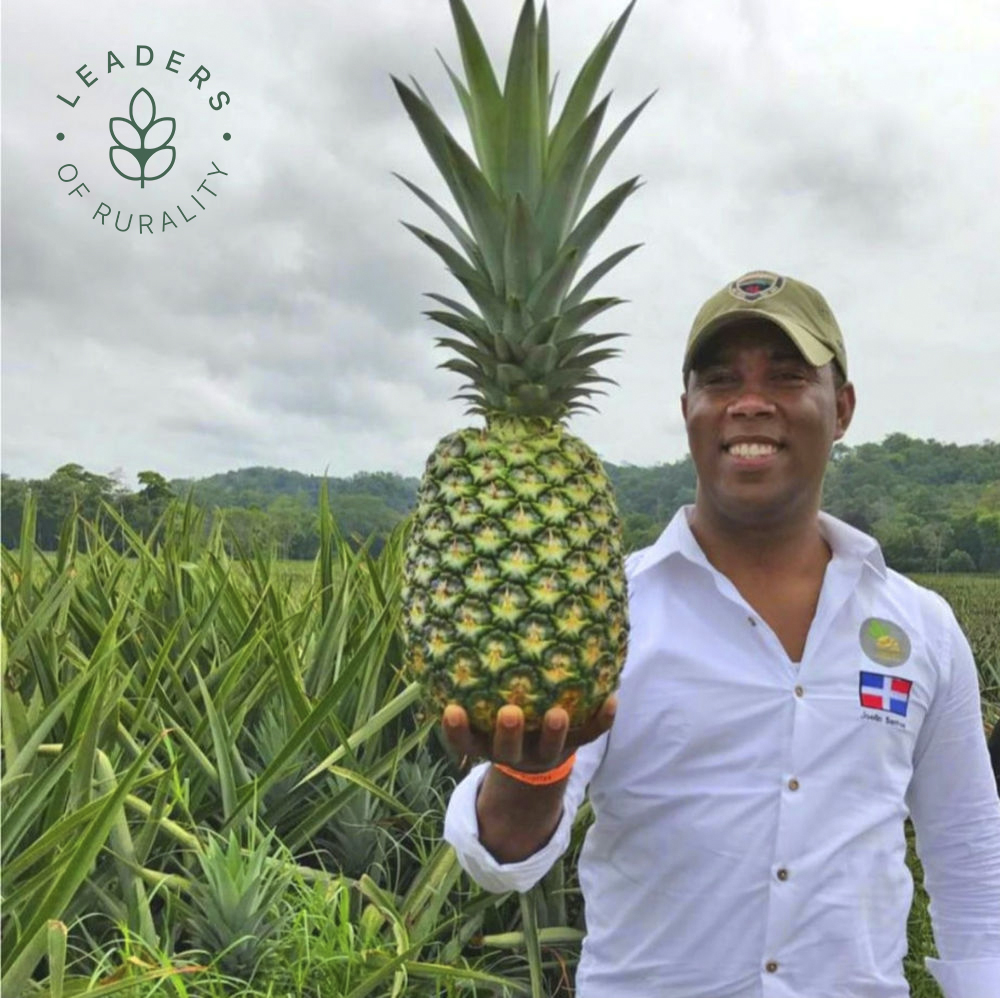Joelin was raised in the countryside and migrated to the city to pursue university studies. He later returned home, convinced that professionalizing agricultural activity would be the key to enabling other rural producers in the Dominican province of Monte Plata and himself to enjoy a decent quality of life.

San Jose, 8 April 2022 (IICA) – Joelin Santos, a Dominican national who spearheaded an innovative agricultural model that has enticed numerous young people in this Caribbean country into pineapple farming, was recognized by the Inter-American Institute for Cooperation on Agriculture (IICA) as one of its “Leaders of Rurality of the Americas”.
The “Soul of Rurality” award, as it is called, is part of an initiative by the specialized agency in agricultural and rural development to pay tribute to men and women who are leaving their mark and making a difference in the rural areas of the Americas – areas that are essential for food and nutritional security and the environmental sustainability of the planet.
Joelin was raised in the countryside and migrated to the city to pursue university studies. He later returned home, convinced that professionalizing agricultural activity would be the key to enabling other rural producers in the Dominican province of Monte Plata and himself to enjoy a decent quality of life.
Thus, he created the Association of Pineapple Producers of Monte Plata, an initiative that changed the lives of many farmers, who were accustomed to struggling to earn a profit from the fruits of their labor.
Today, the association has more than 400 farmers, who produce more than 20 million top-quality pineapples each year, through environmentally friendly agricultural practices, selling them on the national and international market.
More than half of the members of the Association, which was established in 2017, are newcomers to agriculture.
The Leaders of Rurality award pays homage to individuals who are playing a critical dual role, namely as guarantors of food and nutritional security and as custodians of the planet’s biodiversity, producing under all kinds of conditions. The recognition also highlights these individuals’ capacity to project positive examples from the rural areas of the region.
Joelin Santos, the university professional who returned to the countryside to follow the call of his heart
Joelin Santos grew up in Monte Plata, one of the 32 provinces of the Dominican Republic. As a child growing up in the country, he would rise at five in the morning to go to school, and on returning, he would assist with the rural chores – from herding the cows into the pen for milking to going out to collect firewood. His life in contact with nature was interrupted when he moved to the city for university, thereby breaking the family tradition of marrying very young and settling down to life in the countryside.

Joelin Santos grew up in Monte Plata, one of the 32 provinces of the Dominican Republic. As a child growing up in the country, he would rise at five in the morning to go to school, and on returning, he would assist with the rural chores – from herding the cows into the pen for milking to going out to collect firewood. His life in contact with nature was interrupted when he moved to the city for university, thereby breaking the family tradition of marrying very young and settling down to life in the countryside.
Joelin threw himself into in his studies. He studied Law and Military Sciences, earning a Master’s degree in International Relations and a Doctorate in Project Management. Afterwards, when many believed that he would never again return to his roots, he felt the call of the countryside and realized it was time to return.
Joelin recalls that, “On returning, I asked my grandfather to partner with me to cultivate a plot of less than a hectare of pineapple. In the very early stages of the project, we uploaded some photographs to social media and many friends who had never been involved in food production began to take an interest. This marked the beginning of the Association of Pineapple Producers of Monte Plata”.
The 103 producers who created the Association in January of 2017 were tasked with producing a pineapple that was distinctive in flavor, sweetness and quality, that was produced with good agricultural practices and that could be sold in national and international markets.

Today, the association is comprised of more than 400 men and women who have developed a successful business model that not only contributes to the total development of its members, but also to the well-being of the Monte Plata community. Approximately 40% of the Association’s members had previous experience in pineapple farming, whereas the other 60% were youngsters who were new to this activity.
Joelin reflects that, “Returning to the country, to my roots, was an idea that I always secretly cherished. I wanted to give back to my community everything that it had done for me and to demonstrate that if you prepare yourself academically and combine scientific knowledge with experience, you get better results. My aim was to show that, with better information and more knowledge, many rural dwellers can become farmers or agricultural entrepreneurs and in turn improve their standard of living.
On returning to Monte Plata, Joelin sought to discover why many pineapple farmers were not sufficiently profitable or were even losing money, despite the high demand for pineapple in the Dominican Republic market and many other countries of the world. He then identified a number of problems and created a project to resolve them.
One very important conclusion that he arrived at was that production could not be interrupted. “There can be no holidays. Pineapples have to be produced and sold 365 days of the year, because they are always in demand in the market. Many farmers would wait until they had reaped vast amounts of fruit to go out and seek buyers, who would recognize the farmers’ need to sell quickly and would end up paying them prices lower than the cost of production. Moreover, the farmers did not have sufficient produce to export, and in some cases, did not have a clear idea of their costs. On the other hand, they did not employ good agricultural practices to protect the environment”.
The Association put together teams of technical experts with expertise in both production and in collective and professional marketing. The pineapples are reaped when they are mature and ready to be sent to the different markets and placed at the points of sale for consumers within two to three days of being cut, depending on the destination market. Today, the Association produces more than 20 million units per year, half of which is exported to countries such as the United States, Israel, Spain, Italy and Russia.
Joel states that one of the greatest lessons he has learned is that cooperativism and associative enterprises are much more direct paths to a better quality of life in rural communities.
“This dream that we have begun to build in the Association has been transformative, as its rewards have not been merely financial. We are certain that what we have done can serve as a model for other provinces in the country or for milk or corn producers. We want small farmers to know that they do not have to rely on the State for assistance. My community created a change in only five years, despite the severe punishment that the COVID-19 pandemic inflicted on us in the last two years. We do what we do from the heart and we want it to work, because my country and the world need it”, he says enthusiastically.
Today, pineapples in Monte Plata are produced under environmentally friendly conditions, given that the agrochemicals have been awarded environmental protection certification, enabling the farmers to protect the region’s biodiversity. All the elements of the plants are also re-used, thereby guaranteeing a reduction in organic waste.
Joelin explains that, “We changed the mind-set of the traditional farmer, who was unconcerned about protecting the habitat. Many of them would chop down trees to make coal, with no planning. Today we have implemented various projects, funded by the German government, which promote rational land use, while caring for the ecosystem in which the pineapples are grown. Although we are not organic producers, but conventional producers, we do use natural inputs and are reforesting many areas and practicing apiculture, to benefit the environment”.
Pineapples have rekindled Joelin’s love of the countryside and food production. “Being a farmer is one of the greatest privileges that a person can enjoy. Our activity provides food security, generates employment, transforms communities and improves not only our quality of life, but also the lives of many in this area. And everything in the countryside is wonderful, since you can grow your own food and you live in such healthy surroundings”.
In concluding, he remarked that, “Many university professionals are passionate about the countryside and long to do something different. You can live an honorable life from agriculture, if you do the proper research and respect this activity. Many young people want to return to the countryside, because we see it as an opportunity”.
More information:
Institutional Communication Division.
comunicacion.institucional@iica.int











